Key takeaways:
- Understanding homelessness involves recognizing factors like mental health, addiction, and economic instability, rather than viewing it solely as a lack of shelter.
- Charities provide essential services beyond shelter, including job training and mental health support, playing a critical role in empowering individuals toward stability.
- Personal experiences with individuals facing homelessness, such as sharing stories and the impact of small acts of kindness, highlight the need for empathy in advocacy.
- Advocacy fosters community awareness and collective action, mobilizing individuals to address homelessness as a shared responsibility that can affect anyone.
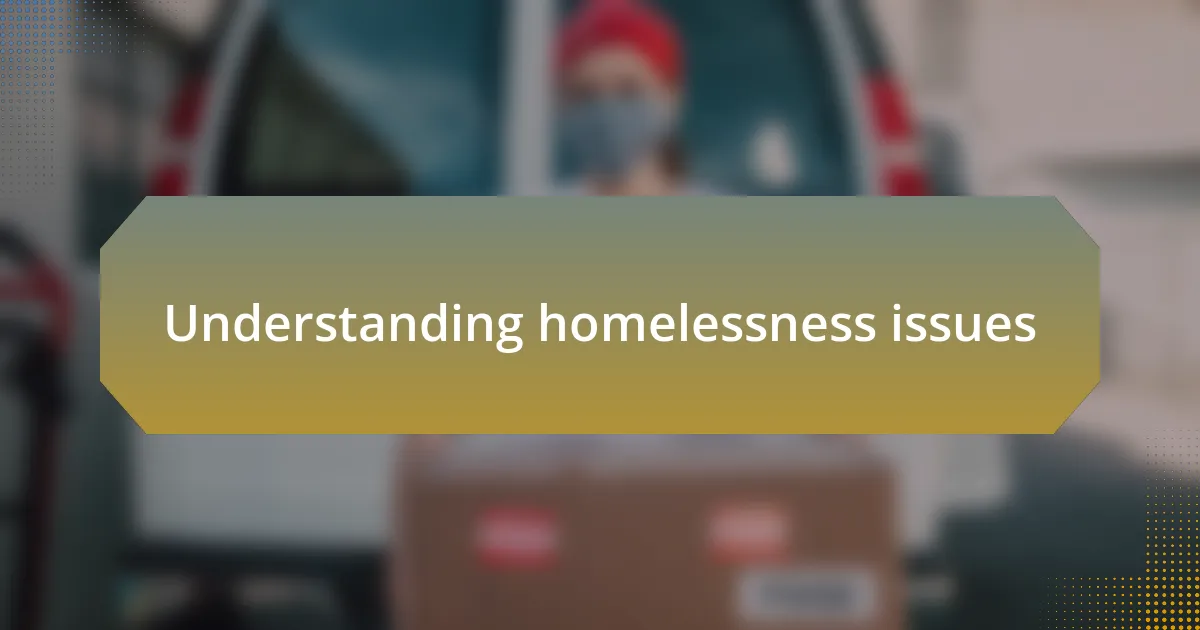
Understanding homelessness issues
Many people view homelessness as just a lack of shelter, but the reality is much more complex. When I first encountered individuals experiencing homelessness, I was struck by the unique stories that each person carried. It made me wonder: what led them to this situation? Understanding homelessness requires delving into issues like mental health, addiction, and systemic failures, as these factors often intertwine.
In my experience volunteering at a local shelter, I encountered a woman named Sarah. She shared how a sudden medical crisis spiraled her into debt, ultimately leading to her losing her home. Hearing her story opened my eyes to how quickly life circumstances can change, and it ignited a passion within me to advocate for better healthcare access and financial literacy programs. Have you ever considered how easily any of us could find ourselves in a similar position?
We often overlook the labels we attach to homelessness, but these generalizations can obscure the human experience behind each statistic. It’s essential to remember that each person has their own narrative filled with aspirations, struggles, and resilience. I’ve learned that empathy is vital in understanding homelessness; it allows us to connect with the individual rather than just the issue.
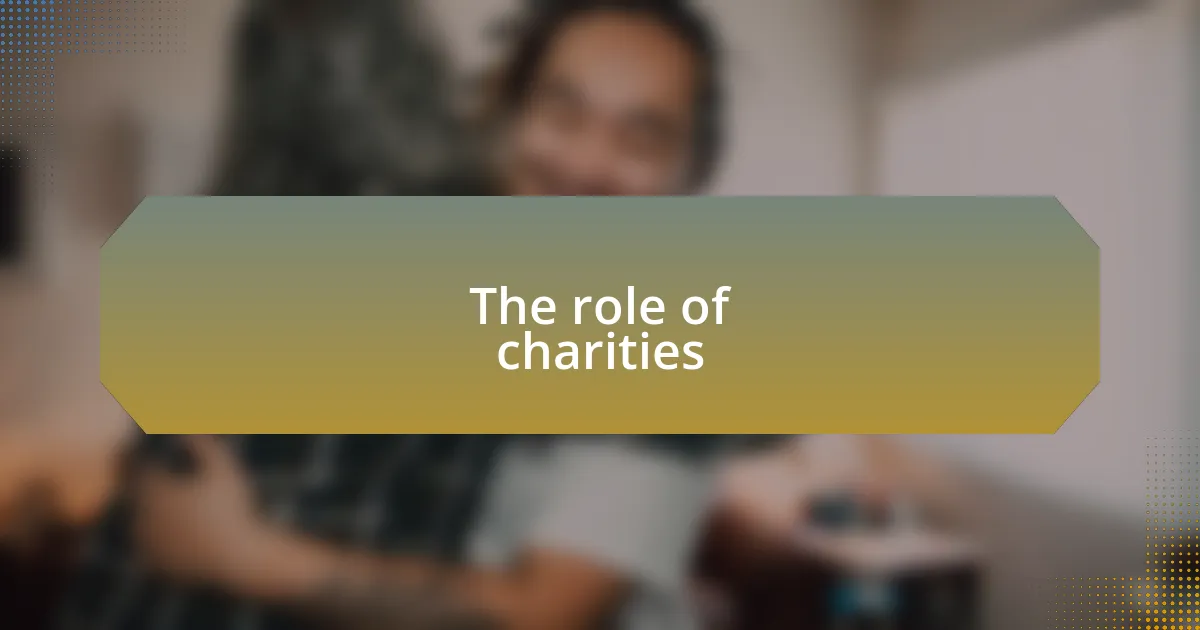
The role of charities
Charities play a crucial role in addressing homelessness by providing essential services that extend beyond mere shelter. During my first volunteer experience at a local organization, I witnessed how food banks and mental health support services created a lifeline for individuals. They didn’t just offer temporary relief; they helped restore dignity, empowering people to rebuild their lives.
I recall one winter evening at the shelter when a man named James opened up about his struggles. He mentioned how the charity’s job training program had given him hope and a sense of purpose. It struck me then how charity initiatives can act as catalysts for change, pushing individuals toward long-term stability. Have you thought about how that kind of support could impact not just one life, but an entire community?
In my advocacy work, I’ve seen that charities also engage in critical awareness and education efforts. They challenge societal perceptions of homelessness, fostering empathy and understanding. This advocacy helps shift the conversation from blame to responsibility, reminding us that we all have a role to play. How can we contribute to a society where everyone has the opportunity to thrive?
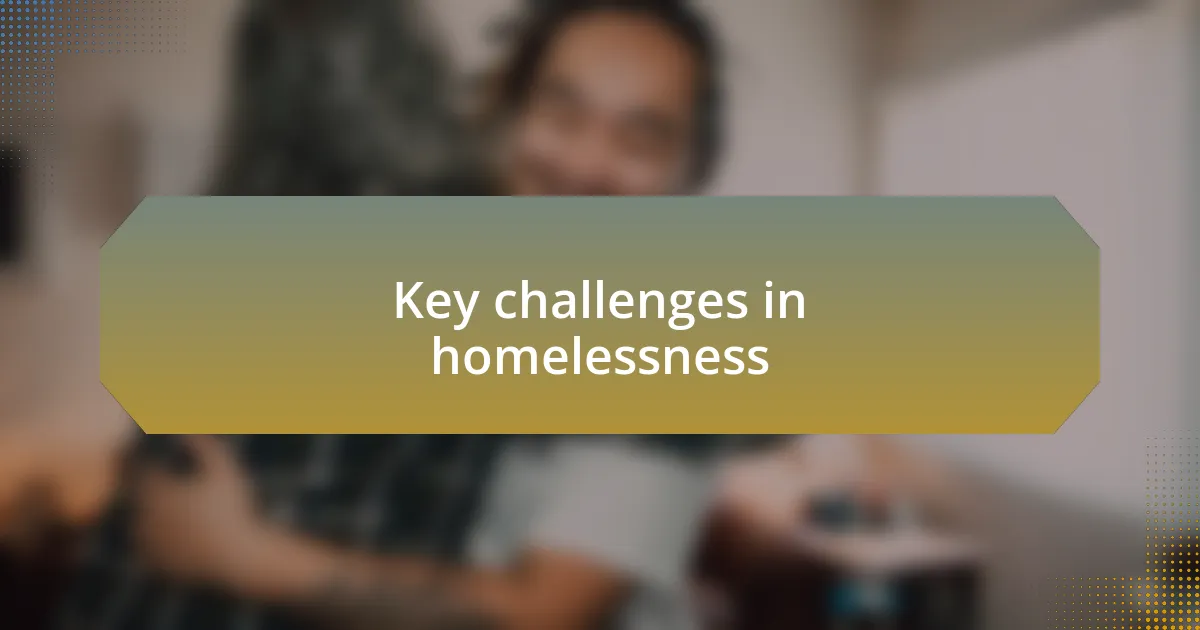
Key challenges in homelessness
Understanding the key challenges in homelessness is vital for effective advocacy. One persistent issue is the lack of affordable housing, which I learned firsthand during a community meeting. People shared stories of families living in cramped conditions or even on the streets, desperately searching for a stable home. It made me realize how systemic factors, like rising rents, can trap vulnerable individuals in a cycle of instability. Have you considered how a single affordable unit could change someone’s life?
Moreover, mental health challenges often intertwine with homelessness, complicating recovery efforts. I remember a poignant moment with a young man named Alex, who struggled with severe anxiety. His story echoed the frustrations many face when seeking mental health support. It’s heart-wrenching to see that despite having access to resources, stigma and misunderstandings can stand in the way of healing. How can we break those barriers and ensure that mental health care is as accessible as it is necessary?
Additionally, navigating social services can feel overwhelming for those experiencing homelessness. I encountered a woman at a resource fair who expressed frustration over the lengthy applications and inconsistent information from agencies. These bureaucratic hurdles can discourage individuals from seeking help, leaving them feeling isolated. Have you thought about how streamlining these processes could empower individuals to take charge of their situations?
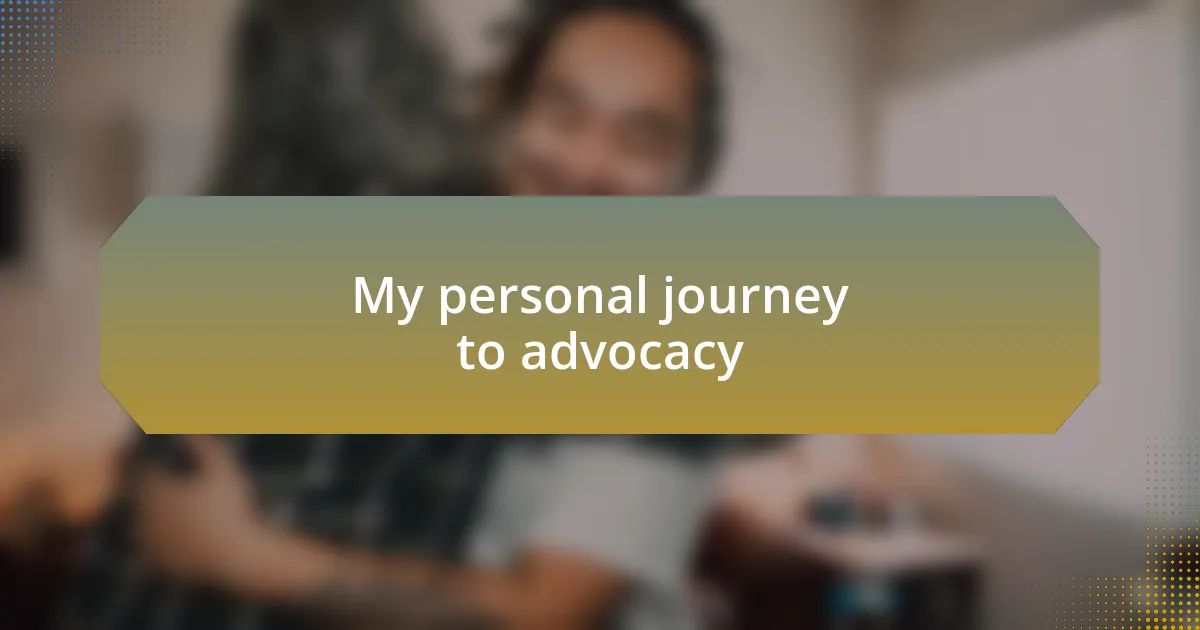
My personal journey to advocacy
My journey to advocacy began unexpectedly during a volunteer shift at a local shelter. I vividly remember meeting a mother with two young children who had lost their home due to an unexpected job loss. As we talked, I saw the raw determination in her eyes, yet there was also a veil of fear—the fear of the unknown, of what tomorrow would bring. It struck me how easily stability can vanish and how imperative it is for us to advocate for those who are one setback away from homelessness.
One afternoon, while handing out care packages, I met an elderly man named Joe who recounted his years of serving in the military, only to find himself on the streets. Hearing his story made me feel a mix of admiration and sadness. Why is it that individuals who served our country end up in such dire circumstances? This experience cemented my belief that advocacy is not just about raising awareness; it’s about amplifying voices like Joe’s that often go unheard.
I can’t help but reflect on the countless conversations I’ve had with individuals facing homelessness—they have shaped my perspective profoundly. It often dawns on me how much we can learn from those we aim to help. Have you ever realized that advocacy starts with listening and understanding the stories behind the statistics? Those moments have driven home the message that each person’s journey is unique, and our advocacy must be as nuanced as the lives we seek to impact.
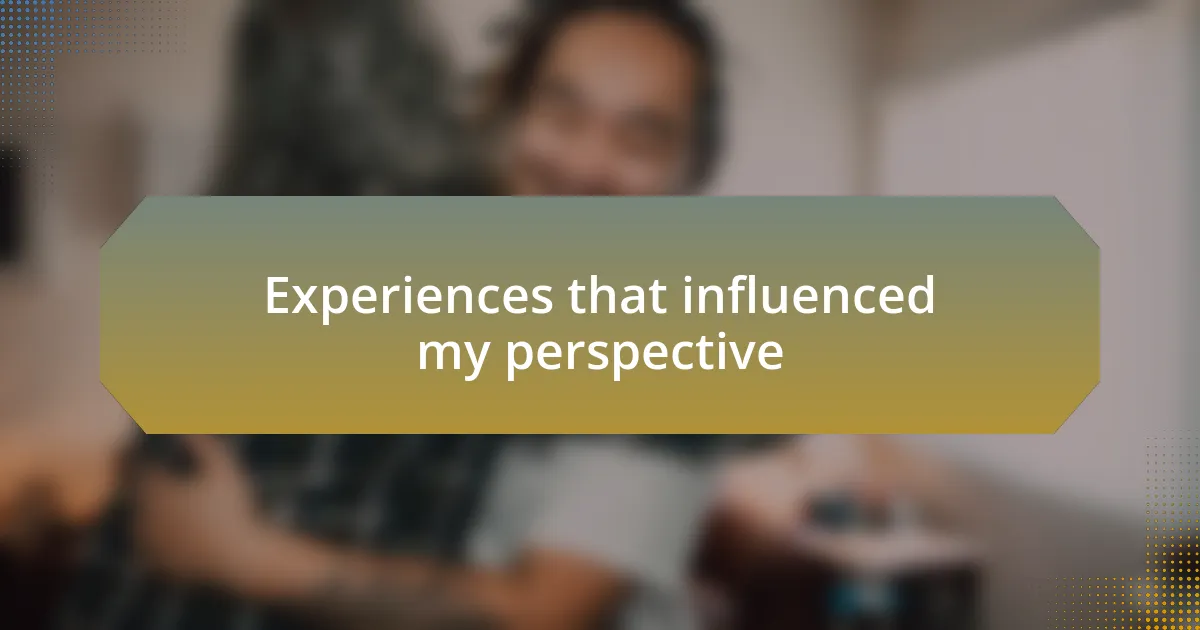
Experiences that influenced my perspective
The moments that truly shaped my advocacy perspective often come from unexpected interactions. I remember sitting across from a young woman named Lisa at a community dinner. As she shared her story, it became clear that losing her job wasn’t just a financial blow; it had shattered her sense of identity. How often do we think about how our roles in society define us? This conversation illuminated the emotional complexity of homelessness, shifting my view from seeing it as a mere statistic to recognizing the human spirit behind each story.
One cold evening, while distributing blankets in a park, I met a group of friends huddled together for warmth. Their laughter struck me as they exchanged light-hearted jokes, a stark contrast to their reality. In that moment, I wondered how resilience can coexist with hardship. This experience reinforced my belief that those experiencing homelessness possess remarkable strength and hope, challenging the common narrative that focuses solely on their struggles.
Reflecting on these experiences makes me realize that advocacy isn’t just about the actions we take; it’s about the connections we forge. I recall the moment when a former client thanked me for simply listening to her. It left me questioning: Are we doing enough to recognize the power of empathy in advocacy? Such moments compel me to advocate for a more compassionate approach, reminding me that behind each statistic is a life waiting to be understood.
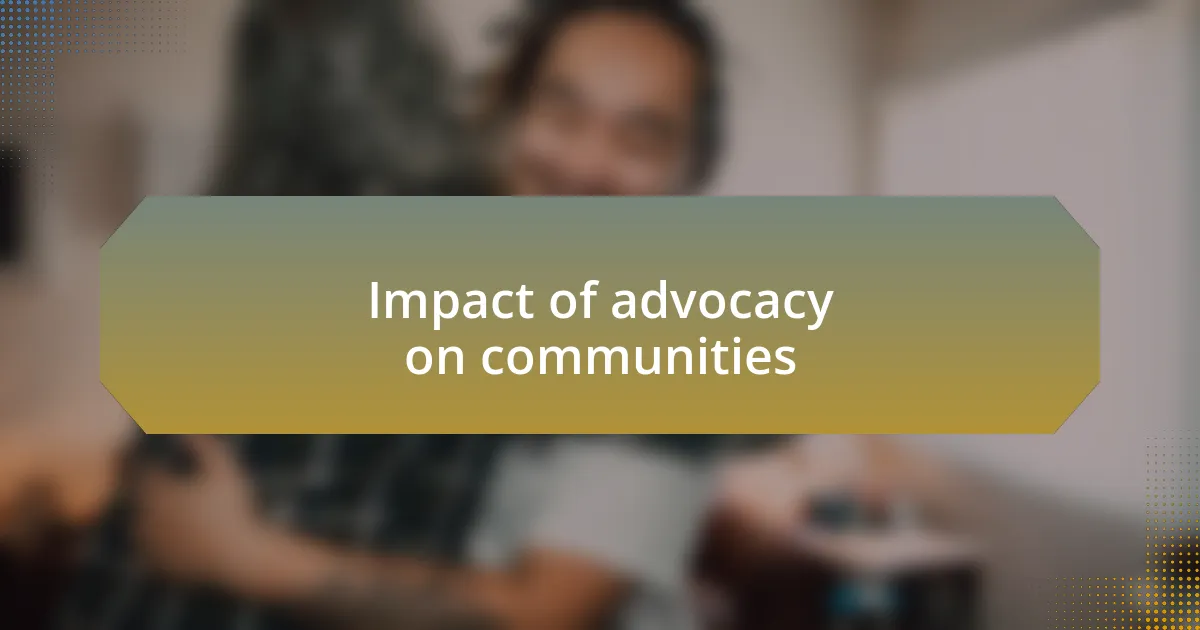
Impact of advocacy on communities
Advocacy has a profound ripple effect on communities, often sparking a collective consciousness around homelessness. I recall attending a town hall meeting where community members passionately debated how best to support our local shelters. Witnessing that diverse group come together made me realize that advocacy cultivates awareness and ignites action; it allows people to recognize that homelessness is not a distant issue but a problem that can affect anyone among us.
On another occasion, while volunteering at a community clean-up, I met a dedicated neighbor who started a grassroots initiative to tackle homelessness. Her determination inspired others to contribute, reinforcing the idea that advocacy can empower individuals to take ownership of their community’s challenges. How many times have we missed the chance to make a difference simply because we felt powerless? This profound connection illustrates how one person’s voice can mobilize many, creating a stronger, more unified front.
In my experience, advocacy not only fosters understanding but also nurtures relationships among community members. I remember the warmth of shared meals at a soup kitchen where volunteers and clients exchanged stories, forging bonds that transcended social barriers. Isn’t it fascinating how empathy can transform our perceptions? This deepened connection ultimately turns advocacy into a community effort, emphasizing that tackling homelessness requires everyone’s involvement and compassion.